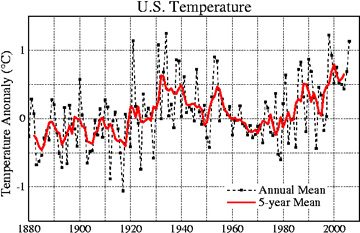Masquerouge
Deity
@Masq: Yes, and only the temps since 2000.

Urederra, you should make that clear in your OP. The correction was only for temperatures in the US...
@Masq: Yes, and only the temps since 2000.

I was born in '72.Where you just as convinced that we were headed for an ice age in 70s? We had the same hype, same "scientific consesus", but in the end it turned out to be completely wrong.
Climate myths: They predicted global cooling in the 1970s
Indeed they did. At least, a handful of scientific papers discussed the possibility of a new ice age at some point in the future, leading to some pretty sensational media coverage (see Histories: The ice age that never was).
One of the sources of this idea may have been a 1971 paper by Stephen Schneider, then a climate researcher at NASA's Goddard Space Flight Center in Maryland, US. Schneider's paper suggested that the cooling effect of dirty air could outweigh the warming effect of carbon dioxide, potentially leading to an ice age if aerosol pollution quadrupled.
This scenario was seen as plausible by many other scientists, as at the time the planet had been cooling (see Global temperatures fell between 1940 and 1980). Furthermore, it had also become clear that the interglacial period we are in was lasting an unusually long time (see Record ice core gives fair forecast).
However, Schneider soon realised he had overestimated the cooling effect of aerosol pollution and underestimated the effect of CO2, meaning warming was more likely than cooling in the long run. In his review of a 1977 book called The Weather Conspiracy: The Coming of the New Ice Age, Schneider stated: "We just don't know...at this stage whether we are in for warming or cooling – or when." A 1975 report (pdf format) by the US National Academy of Sciences merely called for more research.
The calls for action to prevent further human-induced global warming, by contrast, are based on an enormous body of research by thousands of scientists over more than a century that has been subjected to intense – and sometimes ferocious – scrutiny. According to the latest IPCC report, it is more than 90% certain that the world is already warming as a result of human activity (see Blame for global warming placed firmly on humankind).

Where you just as convinced that we were headed for an ice age in 70s? We had the same hype, same "scientific consesus", but in the end it turned out to be completely wrong.
For some reason this part of the article was missing from the OP. It seems to have created a little bit of confusion, so I thought I'd post it anyway.
You're welcome
follow the link for the full article and the opinions....
 (kidding)
(kidding)I saw this article a week ago on some random web site, and was wondering how long it was gonna be before somebody was gonna post it.
I remain undecided on whether it's happening and whether it's really people who are causing it.

Urederra, you should make that clear in your OP. The correction was only for temperatures in the US...
I just copied and pasted the first article I found about the news. I am not sure now that the temperatures are not skewed elsewhere. I mean, why the satellites only skewed US temperatures?
But upon reading your OP I was under the impression that all temperatures were found to be flawed, while right now we only know for certain it's only the US temperatures...
Where you just as convinced that we were headed for an ice age in 70s? We had the same hype, same "scientific consesus", but in the end it turned out to be completely wrong.
Makes you wonder what other measurements are off...
Mean global temperature data still show the 2005 is the warmest year on record. Further, the 5-year mean temperatures in the U.S. continue to show a warming trend.
Currently, 1998 is the warmest year on record, when the global mean surface temperature was 14.54C (58.17F).
Don't mention it.You're welcome

The 5-year mean temperature is another way to interpret the data. The temperatures of the last five years are taken and the mean temperature is calculated. That is supposed to give a better picture to study trends because you wash out odd years.
But the mean global temperature for a year does not take into account the other four previous years. The discrepancy might be because one is global mean surface temperature and the other might be atmospheric, I don't know.

